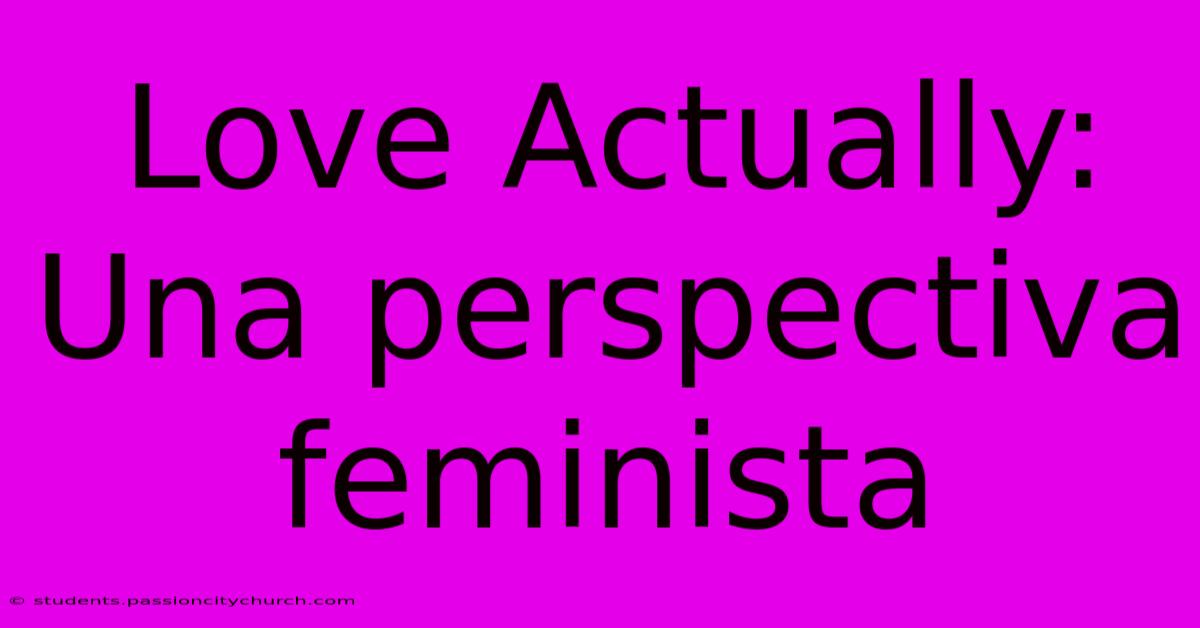Love Actually: Una Perspectiva Feminista

Discover more detailed and exciting information on our website. Click the link below to start your adventure: Visit Best Website. Don't miss out!
Table of Contents
Love Actually: Una Perspectiva Feminista: Examining the Rom-Com Classic Through a Modern Lens
Richard Curtis's Love Actually (2003) remains a holiday staple, a cinematic tapestry woven with interconnected love stories. While charming on the surface, a feminist lens reveals a complex and often problematic portrayal of female characters and their relationships. This article delves into the film's depictions of women, exploring both its progressive moments and its significant shortcomings, ultimately questioning its enduring popularity in a modern, increasingly feminist world.
The Spectrum of Female Representation:
Love Actually presents a diverse, albeit flawed, range of female characters. We see the independent and ambitious Karen (Emma Thompson), struggling with her husband's infidelity; the naive and hopeful Natalie (Martine McCutcheon), navigating unrequited love; and the strong-willed Sarah (Laura Linney), prioritizing her brother's happiness over her own romantic desires. However, these varied portrayals often fall into predictable and sometimes stereotypical tropes.
The Burden of Emotional Labor:
Karen's storyline arguably offers the most nuanced portrayal of a woman in the film. Her quiet suffering and ultimate resilience in the face of her husband's betrayal resonate deeply. However, her strength comes at a cost. She bears the emotional burden of her husband's infidelity, silently navigating her pain and ultimately choosing to stay. This highlights the often-unseen emotional labor women are expected to perform in relationships, silently shouldering the weight of maintaining emotional stability. While her eventual resilience is empowering, the film doesn't fully explore the systemic issues that allow such situations to occur and perpetuate the burden on women.
The Romanticized Pursuit of Unrequited Love:
Natalie's storyline, while seemingly lighthearted, subtly reinforces the problematic notion of persistent pursuit in the face of clear disinterest. Her unwavering infatuation with the Prime Minister, despite his lack of reciprocation, is presented as endearing rather than potentially unsettling. This romanticizes unrequited love, potentially normalizing a behavior that could be interpreted as obsessive and even harassing in different contexts. The narrative doesn't challenge the power imbalance inherent in such a situation, leaving the audience to passively accept Natalie's perseverance.
Sacrifice and Self-Effacement:
Sarah's character arc epitomizes the theme of self-sacrifice. Her unwavering devotion to her brother's well-being overshadows her own romantic aspirations. While her selfless nature is commendable, it also reinforces the traditional societal expectation of women prioritizing the needs of others over their own. The film ultimately rewards her self-effacement, but it fails to critique the inherent unfairness of such a dynamic. Her happiness is secondary, defined by the happiness of those around her.
The "Nice Guy" Trap and the Lack of Female Agency:
Several female characters find themselves trapped in the "nice guy" trope. They are pursued by men who believe their niceness entitles them to romantic reciprocation, ignoring the women's clear disinterest or lack of attraction. This subtly reinforces the idea that women owe men affection simply for their acts of kindness, regardless of mutual attraction or genuine connection. The narrative doesn't challenge this power dynamic, leaving the women to navigate the persistent advances with limited agency.
The Gaze and Objectification:
While Love Actually doesn't overtly sexualize its female characters in the way some films do, the camera often lingers on their appearances, subtly contributing to a sense of objectification. This reinforces the male gaze, framing the women primarily through the lens of male desire rather than fully acknowledging their individual complexities and agency.
The Positive Aspects: Moments of Female Solidarity and Strength:
It’s not all bleak, however. Love Actually does contain moments of genuine female solidarity and strength. The relationship between Karen and her best friend, Mia (Heike Makatsch), offers a glimpse into the importance of female friendships and mutual support. Their shared experience and empathy during moments of emotional vulnerability provide a counterpoint to the more problematic aspects of the film.
Conclusion: A Modern Re-evaluation:
Love Actually's enduring appeal lies in its heartfelt sentimentality and relatable depiction of various love stories. However, viewed through a feminist lens, the film's shortcomings become increasingly apparent. Its romanticization of unrequited love, the perpetuation of the emotional burden on women, and the frequent lack of female agency challenge its timeless status. While some characters display strength and resilience, the overall narrative often reinforces traditional gender roles and expectations. As societal perspectives on gender roles and relationships evolve, a critical re-evaluation of Love Actually becomes essential, acknowledging its charm while simultaneously addressing its problematic portrayal of women and the complexities of love. Its enduring popularity invites a conversation – can we appreciate its festive charm while also recognizing and actively critiquing its limitations in representing modern feminist ideals? The answer, as with many aspects of the film's many interwoven storylines, is complex.

Thank you for visiting our website wich cover about Love Actually: Una Perspectiva Feminista. We hope the information provided has been useful to you. Feel free to contact us if you have any questions or need further assistance. See you next time and dont miss to bookmark.
Also read the following articles
| Article Title | Date |
|---|---|
| Quelle Difference Entre Un Chapon Et Une Dinde | Dec 25, 2024 |
| Weihnachtsfilme Chase Gegen Columbus Die Besten Klassiker | Dec 25, 2024 |
| Co Slychac U Gwiazd Kevina | Dec 25, 2024 |
| Lockdown Hit Our Christmas Plans | Dec 25, 2024 |
| Eiffel Tower Christmas Fire Alarm Evacuation | Dec 25, 2024 |
| Las 15 Mejores Frases Navidenas | Dec 25, 2024 |
| Leading Airline Cancels All Flights Worldwide | Dec 25, 2024 |
| Dolda Detaljer Tomtens Julfilmscen | Dec 25, 2024 |
| Pirates Vs Marumo Super Sport Kragmeting | Dec 25, 2024 |
| American Airlines Christmas Eve Flight Issue | Dec 25, 2024 |
